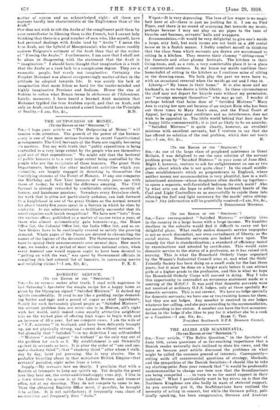[TO THE EDITOR OF THE SPECTATOR."3 SIR, — Your correspondent " Satisfied
Mistress " evidently lives in the country in a large house with a large income. We humbler dwellers in the suburbs would find it difficult to carry out her delightful plans. What really makes domestic service unpopular is not so much discomfort, nor even curtailment of liberty, as the social status. Domestic servants are looked down upon. The remedy for that is standardization; a standard of efficiency tested by examinations and attested by certificates. This would raise domestic service to the status of a profession, as it has raised sick nursing. This is -what the Household Orderly Corps organized by the Women's Industrial Council aims at, and what the Girls' Friendly Society has been doing on a small scale for the last three years; but it must be done on a larger scale before it can attract girls of a higher grade to the profession, and this is what we hope the Household Orderly Corps will succeed in doing. May I take this opportunity to contradict an erroneous statement made at a meeting of the H.O.C.? It was said that domestic servants were not received at ordinary G.F.S. lodges, only at those specially *sr domestic servants. This is not correct. We have no lodge specially for domestic servants; we have one or two training homes for them, but they are not lodges. Any member is received in our lodges whatever her calling, and she pays according to the accommodation, not according to her status. A member can have the best accommo- dation in the lodge if she likes to pay for it whether she be a cook or a Countess.—I am, Sir, Bo., DAM C. TAIT,
President Southwark G.F.S. Diocesan Council.


























 Previous page
Previous page